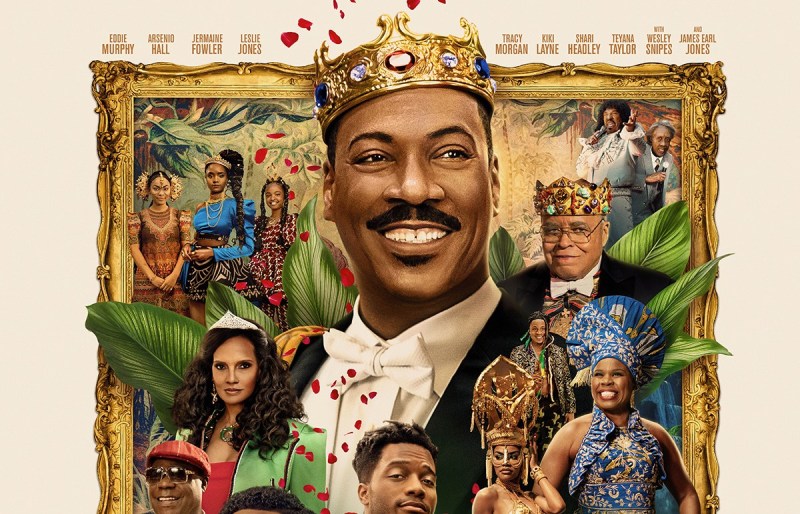Gabriel Andrade
mercatornet.com
Gabriel Andrade is assistant professor of medicine at Ajman University, in the United Arab Emirates. His main area of research is Ethics and Psychology in a medical context, as well as the analysis of cultural phenomena from a psychological and philosophical perspective.
Coming 2 America Directed by Craig Brewer. Starring Eddie Murphy, Arsenio Hall, Jermaine Fowler, Leslie Jones, Wesley Snipes, James Earl Jones. Distributed by Amazon. Running time 110 minutes. Rotten Tomatoes: 50%
From Heart of Darkness to Ace Ventura: When Nature Calls, Western representations of Africa have been loaded with Orientalist stereotypes of hypersexuality, despotism, savagery and exoticism. In this post-colonialist epoch, many of these representations are routinely criticized— and rightly so.
But somehow, if the actors lampooning Africa have a darker skin color, few people care. Take the 1988 film Coming to America, and its recently released sequel, Coming 2 America. Every imaginable colonialist trope is reproduced in these films, not least of which is Zamunda’s palace guards, who seem to be taken out of a Tarzan movie. And yet, the media gives Eddie Murphy and his crew a free pass.
In this age of identity politics, many would claim that only black people have the right to mock other black people (just as only black people can ever use the N-word). Furthermore, as the tired old mantra goes, “black people cannot be racist because they have no power.” It is time for a reality check. African-Americans can be as colonialist and racist as their white counterparts, and many in Africa are deeply aware of this. Liberia is a case in point. In the 19th Century, freed American slaves colonized that country, severely abusing the natives. Liberia still suffers the effects of that particularly traumatic experience.
Be that as it may, artists may be partly forgiven for their colonialist tropes, if at least such tropes were used to criticize the many flaws of Western civilization. In the 18th century Montesquieu did exactly that in Persian Letters: he portrayed Persian visitors to Europe as brutal despots. But in doing so, he also poked the eye of Western aristocrats, by showing that they were not all that different. Borat did something to similar effect, and in 1988, Coming to America also engaged with this tactic. In mocking the Other, one can always do self-criticism.
Coming 2 America falls short in this endeavor.
Prince Akeem finds out he sired a son in New York and decides to search for him. So, here the film comes to terms with one of the most pressing problems in the African-American community: absent fatherhood. It would seem as if the film, while lampooning Africans, would also make a meaningful critique of African-American culture. But the film blows up that opportunity. In fact, the film dismisses absent fatherhood as if it were no big deal at all. Indeed, this view is quite the norm, as in Black Lives Matter’s infamous statement (now deleted from their website): “We disrupt the Western-prescribed nuclear family structure requirement.”
Lavelle — Akeem’s son — is interviewed for a job by a condescending white employer. The employer asks him if it is hard not having a father, because scientists say that not having a father figure at home is detrimental to the child. Lavelle is surprised that scientists would say that, and asks who those scientists are. The white employer responds with the names Bill Nye “The Science Guy” and Neil de Grasse Tyson. Obviously, these are not social scientists (and, as far as I know, they have never commented on African-American family structure), so the scene portrays a very ignorant white employer who seemingly just repeats some racist media soundbite.
Sadly, absent fatherhood is no joke, and scientists do say what the white employer claims in this scene. In a desperate attempt to confront the issue, Lavelle pulls from his sleeve an ace that is typically used by woke activists: whataboutism. Lavelle says that not having a father is as bad as having a father donate money to get his child to go to an Ivy League School. Now, of course college admissions are far from ideally fair in the United States, but to think that that particular problem is as pressing for African Americans as the absence of fathers in homes, is delusional.
After this confrontation, Lavelle leaves the office, by countering, “I can’t wait for them to find blackface photos of you from the office party”, to which the white employer replies, in an admission of racism, “I was Will Smith’s Aladdin.” The scene could not be more ironic, as in a later scene, Eddie Murphy plays the white character in the barbershop. So, as per woke rules, a white actor can never play a black character, but vice versa is fine. Usbek (from Montesquieu’s Persian Letters) would have found this very strange, but somehow, for the woke crowd, this is quite normal.
Anyways, enough with the critical analysis. Is the film at least as funny as the 1988 original?
Absolutely not. In a palace conversation with his soon-to-be bride, Lavelle says that most movie sequels are dull. He is right, and Coming 2 America is a case in point. This sequel is much richer in music and dance, but not in laughs. It uses the original movie’s old formulas, and where it tries to innovate, it does so with boring woke clichés.
Thumbs down.
Please share this article so that others can discover The BFD.

